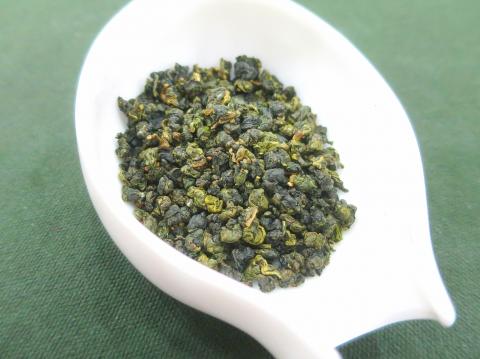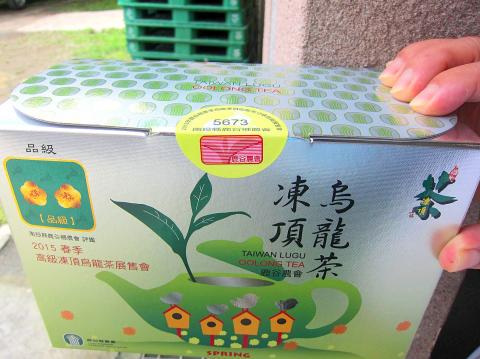Once a major tea-exporting country, Taiwan now produces less than 1 percent of the 3 million metric tons of tea produced around the world annually, but for international tea enthusiasts, Taiwan’s oolong tea industry is worth taking a trip to learn about.
Some have been able to do it through the “Taiwan Oolong Study Tour” program, or “TOST,” launched by the “Ambassador of Taiwan Tea” Thomas Shu (許正龍) and his wife Josephine Pan (潘掬慧) in 2008.
The program is the centerpiece of Shu’s mission to build the international reputation of Taiwan’s oolong teas and generate overseas demand for them to boost the tea industry, which has been in decline for years.

Photo: Liu Bin-quan, Taipei Times
This year’s promotional study tour, held for a 10th consecutive year, was attended by 11 tea professionals, about the same number as in previous years.
But this year’s group featured a far more diverse range of nationalities, with participants coming from Australia, Kuwait, Brazil, Argentina, Nepal and the US.
During the eight-day tour that concluded on Oct. 26, TOST members, led by Shu and Pan, visited tea farms producing seven varieties of oolong tea, participated in hands-on tea processing and met with tea scientists on the Council of Agriculture’s Tea Research and Extension Station (TRES).

Photo: Hsieh Jie-yu, Taipei Times
For many, the tour painted a different picture of Taiwan’s tea sector than what they had envisioned.
Simone Adamson, who joined TOST with her husband, said Taiwan wasn’t really on their radar as a place to visit until they started their tea company, More Tea, in Australia. Adamson said they learned through the TOST program that Taiwan is trying hard to be progressive in the tea industry and that the industry is willing to embrace change.
“It’s entrepreneurial, and the younger generation are willing to engage with new ideas and practices and also willing to engage with new customers like us,” she said.
Tania Stacey, owner of Cuppa Cha in Australia who was taking part in her third TOST, said that she has gained a real appreciation for tea’s place in Taiwan.
“I find Taiwan’s tea culture to be highly dedicated to providing the best tea experience and a wonderful, positive reflection of Taiwan’s history and its influences,” said Stacey, who was crowned Australian World Tea Brewers Cup Champion in September.
Stacey said her winning brew was made with Huang Ya from China but that it was blended with Hong Yu 21 from Taiwan “to add a nice body of citrus aroma and flavor. This tea with its natural citrus aroma and flavor is unique to Taiwan,” she said.
She also said Taiwan oolongs have “a smoothness and silky texture that continues to last and turns to a pleasantly sweet aftertaste,” characteristics that she adds come “from the terroir and dedication of TRES and the tea farmers to provide high quality special teas.”
Paul Richards, who owns The Tea Buzz, a tea shop in Oregon, said he was impressed with the level of technical expertise of the TRES and how that information is shared with the farmers, which benefits the entire industry.
MARKETING REQUIRED
He was also very appreciative of the efforts being made by Shu and Pan but felt more was needed for Taiwan’s tea industry to emerge, including having all tea farmers move toward certification.
Even more important is larger scale promotion, including establishing a larger presence at major tea conferences around the world, citing efforts by Sri Lanka.
“This year Sri Lanka celebrated 150 years of tea and they had a major presence at the World Tea Expo in Las Vegas. They did a nice job showing people in the industry what they are about,” Richards said.
“I think that the tea industry leaders in Taiwan should consider doing something similar [next year],” he said.
Richards was referring to next year marking 150 years since Taiwanese teas were first exported in 1869 by British merchant John Dodd, who shipped Taiwanese oolong teas under the name Formosa tea to New York.
Ahmad Aleidan, owner of Bayan Artisan Tea in Kuwait agreed that more promotion was needed.
He said Ceylon Teas from Assam, India are the most common teas in the Middle East and Arabian Gulf, and Japanese matcha is building a strong presence.
“Sadly I’m the only one that I know who offers any Taiwanese Tea,” he said.
But Aleidan said he will continue to strongly promote Taiwanese teas as he did for the last few years. “I’m optimistic that people [here] will pick up strongly soon.”

In the March 9 edition of the Taipei Times a piece by Ninon Godefroy ran with the headine “The quiet, gentle rhythm of Taiwan.” It started with the line “Taiwan is a small, humble place. There is no Eiffel Tower, no pyramids — no singular attraction that draws the world’s attention.” I laughed out loud at that. This was out of no disrespect for the author or the piece, which made some interesting analogies and good points about how both Din Tai Fung’s and Taiwan Semiconductor Manufacturing Co’s (TSMC, 台積電) meticulous attention to detail and quality are not quite up to

April 21 to April 27 Hsieh Er’s (謝娥) political fortunes were rising fast after she got out of jail and joined the Chinese Nationalist Party (KMT) in December 1945. Not only did she hold key positions in various committees, she was elected the only woman on the Taipei City Council and headed to Nanjing in 1946 as the sole Taiwanese female representative to the National Constituent Assembly. With the support of first lady Soong May-ling (宋美齡), she started the Taipei Women’s Association and Taiwan Provincial Women’s Association, where she

It is one of the more remarkable facts of Taiwan history that it was never occupied or claimed by any of the numerous kingdoms of southern China — Han or otherwise — that lay just across the water from it. None of their brilliant ministers ever discovered that Taiwan was a “core interest” of the state whose annexation was “inevitable.” As Paul Kua notes in an excellent monograph laying out how the Portuguese gave Taiwan the name “Formosa,” the first Europeans to express an interest in occupying Taiwan were the Spanish. Tonio Andrade in his seminal work, How Taiwan Became Chinese,

Mongolian influencer Anudari Daarya looks effortlessly glamorous and carefree in her social media posts — but the classically trained pianist’s road to acceptance as a transgender artist has been anything but easy. She is one of a growing number of Mongolian LGBTQ youth challenging stereotypes and fighting for acceptance through media representation in the socially conservative country. LGBTQ Mongolians often hide their identities from their employers and colleagues for fear of discrimination, with a survey by the non-profit LGBT Centre Mongolia showing that only 20 percent of people felt comfortable coming out at work. Daarya, 25, said she has faced discrimination since she